Feb 2022 2nd Edition
Feb 2022 2nd Edition tsoana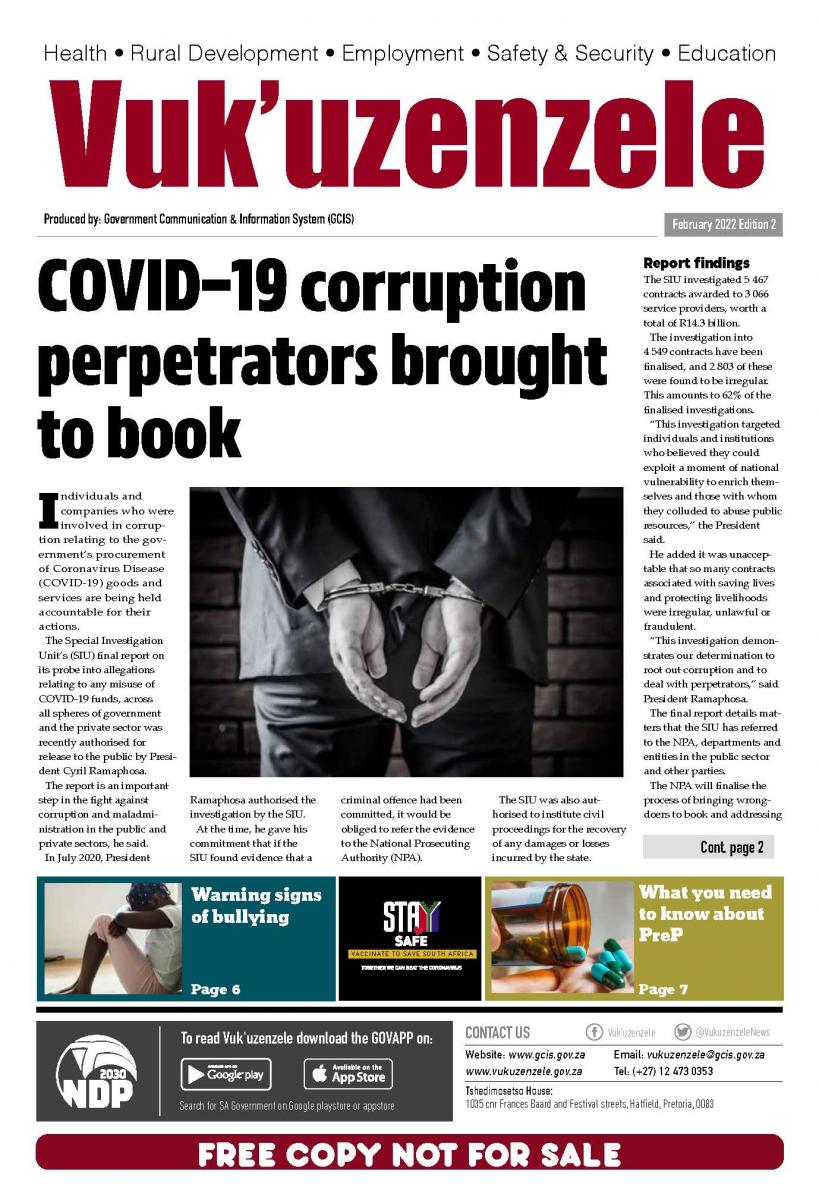
English PDF version
Translations
Afrikaans
isiNdebele
isiXhosa
isiZulu
Sepedi
Sesotho
Setswana
Siswati
Tshivenda
Xitsonga
Be counted in Census 2022
Be counted in Census 2022 SiboneloYou can help build a better South Africa by taking part in Census 2022, which is being conducted nationwide from 3 to 28 February.
Census 2022, run by Statistics South Africa (Stats SA), is a count of the country’s total population – including children, homeless people and foreign nationals within the country’s borders.
Information is collected about people’s living conditions, access to basic services, income, agricultural activities, food security, health, education levels and services, among others, says Trevor Oosterwyk, the Communication Manager at Stats SA.
This this information, which is not shared with any public or private entity, is used by government for planning, policy formulation, evidence-based decision-making and budget allocations across local, provincial and national government, he adds.
Municipalities also use the information to draw up their Integrated Development Plans, which aim to coordinate the work of local and other spheres of government to improve the quality of life for all the people living in an area.
Home Visits
If you did not register online to take part in Census 2022, a Stats SA fieldworker will visit your home, even if your premises has gate control.
“Publicity is done at local level, including with gatekeepers, for example, body corporates. This will enable fieldworkers to access complexes and other walled areas.
"We are also identifying old age homes and other such establishments to let them know about the census,” says Oosterwyk.
Fieldworkers normally go to households during the day, but community members can arrange with them for an alternative time, when they are available.
Statistician-General Risenga Maluleke says a minimum of 165 000 fieldworkers have been deployed across the country, and all fieldworkers have been trained on Coronavirus Disease safety protocols, as per the Department of Health’s guidelines.
Beware of scammers
All fieldworkers have to produce their Stats SA identity card, which displays the Stats SA logo and the fieldworker’s photograph and unique number. They also have to wear Census 2022 branded shirts.
You can verify a fieldworker’s identity by visiting Stats SA’s website at http://census.statssa.gov.za/#fieldwork or calling the Census 2022 toll-free number at 0800 110 248.
Stats SA will never ask you for information about your banking details or ask you to pay any money to participate in Census 2022.
For more information, visit www.census.statssa.gov.za.
CACH connects students with learning opportunities
CACH connects students with learning opportunities SiboneloYoung people who have not yet secured spots at higher education institutions can turn to the Central Application Clearing House (CACH) system for help.
CACH is an online government service managed by the Department of Higher Education and Training (DHET). The service helps those who need access to university, technical and vocational education and training (TVET) colleges and skills development opportunities.
“CACH services have been available from 24 January 2022, and will close on 31 March, to assist those who need to enter tertiary education but face challenges with getting space,” says Minister of Higher Education and Training Dr Blade Nzimande.
CACH can help those who applied for admission to a university or a college on time in 2021, but were not offered a place in a programme of their choice.
The DHET explained that this usually happens when the applicant does not meet the necessary requirements or the institution has reached its limit on the number of students it can enrol.
CACH can also help those who applied to a higher learning institution and were accepted, but now want to change their courses.
CACH will refer individuals to career development services and where possible, provide an opportunity for them to be considered for spaces still available at universities, TVET colleges or Sector Education and Training Authority (SETA) learnerships, without having to travel to any institution.
All public universities, TVET colleges and SETAs can access the CACH database to search for individuals who meet the criteria for available spaces.
“Institutions select individuals from the CACH database and make direct contact with those they have selected,” says DHET spokesperson Ishmael Mnisi.
Applicants who sign up for CACH must submit their details, including their preferred fields of study. Applicants have options to accept or reject study offers on the CACH system.
Institutions of higher learning will only be able to access applicants’ information from CACH once applicants have signed up and uploaded their Grade 12 results.
Mnisi says CACH also helps prospective students who are undecided about career choices by referring them to DHET’s Khetha Career Development Service.
Sign up for CACH via the WhatsApp Chatbot (078 776 8660), USSD *134*225# or online at cach.ac.za. For more information about CACH, visit the Facebook page at CACH_SA.
COVID-19 corruption perpetrators brought to book
COVID-19 corruption perpetrators brought to book SiboneloIndividuals and companies who were involved in corruption relating to the government’s procurement of Coronavirus Disease (COVID-19) goods and services are being held accountable for their actions.
The Special Investigation Unit’s (SIU) final report on its probe into allegations relating to any misuse of COVID-19 funds, across all spheres of government and the private sector was recently authorised for release to the public by President Cyril Ramaphosa.
The report is an important step in the fight against corruption and maladministration in the public and private sectors, he said.
In July 2020, President Ramaphosa authorised the investigation by the SIU.
At the time, he gave his commitment that if the SIU found evidence that a criminal offence had been committed, it would be obliged to refer the evidence to the National Prosecuting Authority (NPA).
The SIU was also authorised to institute civil proceedings for the recovery of any damages or losses incurred by the state.
Report findings
The SIU investigated 5 467 contracts awarded to 3 066 service providers, worth a total of R14.3 billion.
The investigation into 4 549 contracts have been finalised, and 2 803 of these were found to be irregular. This amounts to 62% of the finalised investigations.
“This investigation targeted individuals and institutions who believed they could exploit a moment of national vulnerability to enrich themselves and those with whom they colluded to abuse public resources,” the President said.
He added it was unacceptable that so many contracts associated with saving lives and protecting livelihoods were irregular, unlawful or fraudulent.
“This investigation demonstrates our determination to root out corruption and to deal with perpetrators,” said President Ramaphosa.
The final report details matters that the SIU has referred to the NPA, departments and entities in the public sector and other parties.
The NPA will finalise the process of bringing wrongdoers to book and addressing weaknesses identified by the SIU investigation, the President explained.
Action taken
Since the start of the investigation, the SIU, working with other agencies, has made the following progress:
- 45 matters, with a combined value of R2.1 billion, have been enrolled with the Special Tribunal on Corruption, Fraud and Illicit Money Flows. The special tribunal has a statutory mandate to recover public funds stolen through corruption, fraud and illicit money flows, and take civil action against perpetrators;
- 224 cases have been referred for disciplinary action against officials in government departments or entities;
- 386 cases have been referred to the NPA, and three have been referred for executive action;
- 330 cases have been referred for administrative action, which includes blacklisting (not being able to do work for government).
According to the report, a total of R551.5 million (value of cash and assets) is to be recovered, while R34.2 million has been recovered to date.
The investigation prevented a R114.2 million loss, and set contracts aside valued at R170.4 million.
The SIU expects these matters to be completed between March and April 2022, before the submission of a supplementary report to the President at the end of June.
The report does not include details of ongoing investigations into allegations received by the SIU after the deadline set for the final report.
These include investigations into 476 service providers, linked to 964 contracts, valued at more than R961.6 million.
The outcomes of these investigations, the Presidency said, will also be provided in the June report.
The President thanked the SIU for the work done in the past 18 months, and also whistle-blowers and other witnesses who provided information to investigators.
The public can assist in the fight to end corruption at state institutions by reporting corrupt activities on the SIU hotline at 080 003 7774.
Child support grant finances startup
Child support grant finances startup tsoanaPumla Gobelo (38) from Dutywa in the Eastern Cape has become an entrepreneur, thanks to the assistance she received from government through the child support grant.
In 2011, Gobelo used the child support grant she was receiving for her daughter to start a business selling chicken livers and hot dogs in Dutywa town.
The child support grant is a government initiative that financially supports unemployed parents. The grant is administered via the South African Social Security Agency and pays out a monthly stipend of R46 0 a month for a child.
0 a month for a child.
“I started to sell in the streets of Dutywa in 2011. I began with a capital of R350 at the time, from the government child support grant. I sold hot dogs and chicken livers,” she says.
Department of Social Development (DSD) spokesperson Nomfundo Xulu-Lentsoane says DSD does not prescribe what beneficiaries must do with their grant. "We encourage beneficiaries who use the grant to be sustainable," says Xulu-Lentsoane.
Overcoming abuse and addiction
Gobelo says when she was in high school, she was sexually abused by her school teacher and she took to drugs to ease the pain.
“I kept the abuse to myself for years. I was also physically abused by the father of my child. During that time, I even thought of committing suicide,” says Gobelo.
One day she decided to make make a better life for herself and child. “I decided to sober up and start a new life and a business,” she says.
With money made from the business, Gobelo managed to take care of her child and still had enough money to grow her business.
In 2020, she posted on Facebook that she wanted to expand her business by running a mobile kitchen. “The response from my Facebook friends, some of them my customers, was overwhelming. They donated a mobile kitchen for my business.”
She named her business Mbuks Catering Services.
Gobelo’s business now operates from Butterworth and she sells about 50 plates of food a day. She also runs a catering business on the side for events.
For more information on applying for the child support grant, call 0800 601 011.
If you are a survivor of Gender-Based Violence (GBV) and need assistance, contact the GBV Command Centre at 0800 428 428.
Copper Fresh designs smart masks
Copper Fresh designs smart masks SiboneloThree local innovators have produced a smart, self-cleaning mask they say is effective against many skin conditions such as acne and is reusable for up to a month. 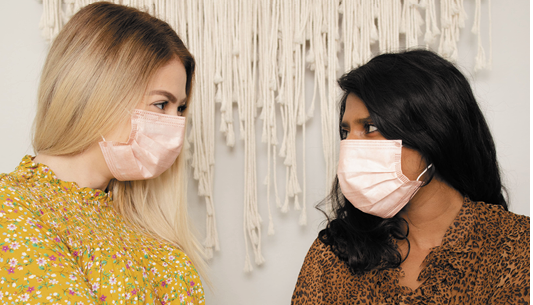
Copper Fresh’s Dean Lazarus, David Ash and Roy Miller started producing and selling their masks in 2021, after a period of research and development.
The mask has been endorsed by Proudly South African under its #BuyLocalToCreateJobs campaign.
The masks are also approved by the South African Health Products Regulatory Authority.
Lazarus, a co-owner of Copper Fresh, says the product came about after the developers gave much thought to the use of technology in fighting the Coronavirus Disease (COVID-19) and other viruses and bacteria.
The masks are produced with an infusion of copper oxide, which acts as a natural antiviral to help protect against COVID-19 and respiratory infections.
A local product
The three entrepreneurs were concerned that most personal protective equipment (PPE) was being shipped in from overseas.
“South Africa has the skill and know-how to produce products that are just as good or even better than the products other countries have to offer,” he says.
With high international freight costs out of China, he says they had an amazing opportunity to produce high-quality products for both the local and international market at a cost that makes sense.
Lazarus says South Africa has the potential to be self-sufficient and create jobs, which is crucial given the country’s employment challenges, particularly among the youth.
The masks are currently sold online, but will soon be available at Clicks stores nationwide. Lazarus says their vision is to have all healthworkers in Africa wear their PPE.
Copper Fresh currently has five people who are involved full time in the business, but Lazarus says as the business scales up and demand for the product grows, they hope to increase the number of employees.
To purchase a Copper Fresh mask visit www.copperfresh.co.za
From farm labourer’ son to winery owner
From farm labourer’ son to winery owner tsoanaThe child of a wine farm labourer, Paul Siguqa has rewritten his story by becoming the owner of Klein Goederust Boutique Winery and Restaurant in Franschhoek, which is the only 100% black-owned wine farm in the area.
“I want to change two narratives with this wine farm. The first narrative is that the children of wine farm labourers will automatically follow in the same path.
The second is that, as black people, we fail when we are given land,” says Siguqa, who bought the 10-hectare farm in 2019.
His mother, Nomaroma was a farm labourer and later worked in the cellar of a local wine farm. She served as Siguqa’s inspiration.
Today, his top wine is named Nomaroma, in her honour.
The determination shown by Siguqa has seen him receiving a tractor from the Western Cape MEC of Agriculture, Ivan Meyer. The handover formed part of the department’s producer support and development programme.
Previously, the department contributed towards the upgrading of the farm’s irrigation system.
Siguqa applied for support through the provincial government’s Agricultural Producer Support and Development (APSD) programme.
This programme is facilitated by a state-owned company called Cape Agency for Sustainable Integrated Development in Rural Areas (Casidra).
The APSD programme assists farmers with producer support services, extension and advisory services, and food security services.
In turn, Siguqa has been able to support the community by employing 17 people, who work on the farm, and in the wine tasting room and restaurant.
During a visit to the winery, Minister of Agriculture, Land Reform and Rural Development Thoko Didiza said the farm is going to be a great contributor to employment and tourism to the area.
“The opening of the wine tasting room and restaurant is testimony to government’s efforts of ensuring equitable access and participation of black people in the wine value chain and the wine industry,” she said.
Siguqa says he owes much of his success to government’s assistance and the bonds he has formed with established farmers. He says he is being mentored by Hanneli Rupert-Koegelenberg of La Motte wine estate.
To apply for APSD assistance, contact Casidra at 021 863 5000 or visit www.casidra.co.za
Get tested for malaria
Get tested for malaria SiboneloThe National Institute for Communicable Diseases (NICD) is urging everyone presenting with a fever or a 'flu-like' illness residing in Limpopo, KwaZulu-Natal and Mpumalanga or people who have travelled to Mozambique recently to be tested for malaria. According to the NICD, patients who test positive for malaria need to start on treatment immediately.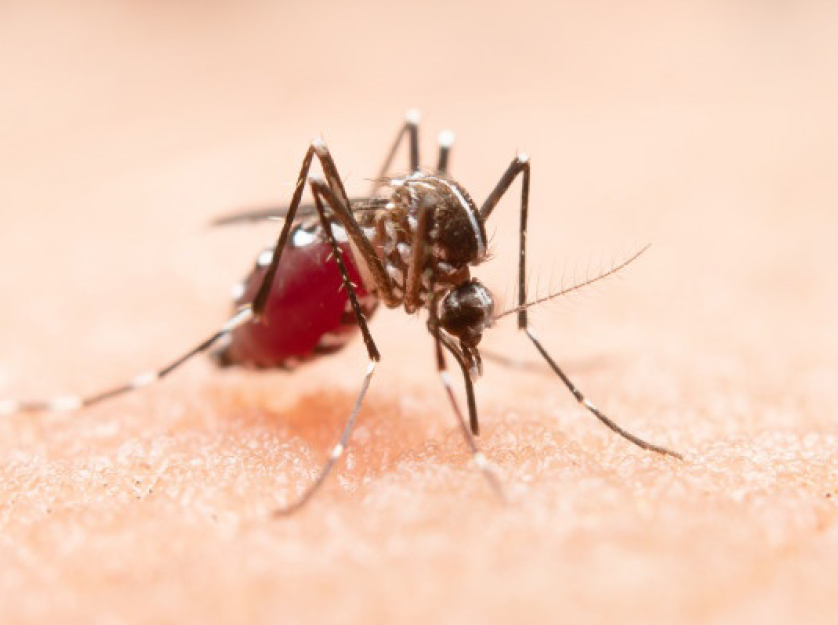
“Despite South Africa entering its peak malaria season, many malaria cases are being misdiagnosed as the Coronavirus Disease (COVID-19). Both malaria and COVID-19 have similar symptoms, including fever, chills, headaches, fatigue and muscle pain,” the NICD says in a statement.
Other symptoms of malaria include vomiting, nausea and diarrhoea.Undiagnosed and untreated malaria rapidly progresses to severe illness, with a potentially fatal outcome, the NICD cautioned.
Patients should inform their healthcare provider of recent travel to neighbouring countries and local malaria risk areas.
Limpopo, KwaZulu-Natal and Mpumalanga are considered South Africa’s malaria risk areas, while Mozambique is among the 10 nations with the highest burden of the fatal disease worldwide.
“Odyssean or ‘taxi malaria', which is transmitted by hitch-hiking mosquitoes, should be considered in a patient with unexplained fever who has not travelled to a malaria area, but is getting progressively sicker,” the NICD explained.
Malaria is a potentially life-threatening disease caused by bites of infected mosquitoes.
Globally, malaria is one of the six major causes of death from communicable diseases, of which 90% of the world’s approximately 440 000 annual malaria fatalities occur in Africa.
According to the NICD’s data, from 2015 to 2019, South Africa had between 10 000 and 30 000 notified cases of malaria per year.
To get tested for malaria, visit your nearest healthcare centre. - SAnews.gov.za
Mathematician's calculation pays off
Mathematician's calculation pays off tsoanaMothupi Kgopa is a mathematician who has invented a scientific calculator named Geleza, which uses both solar and battery power.
“The solar power takes first preference to save the life of the battery. The calculator does not need to be charged in the sun and works indoors without a battery,” says Kgopa who is from Polokwane in Limpopo.
He explains that Geleza means ‘go to school’ in township slang.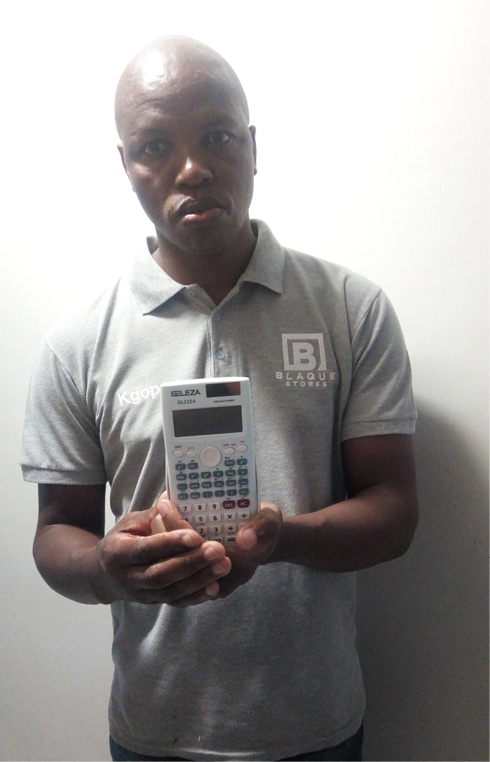
He believes learners in rural areas spend a lot of money on scientific calculators, and says they are expensive as they cost R320 each. The Geleza calculator will cost the consumer R150.
Kgopa also runs Kgopa Foundation for mathematics, which seeks to instil a passion for mathematics in rural learners. The idea for the scientific calculator was sparked when Kgopa wanted to buy calculators for his learners.
“I spent at least R320 for a single calculator. I tried different ways to get my students affordable calculators and it then hit me that I could turn this quest into a business and Geleza was born.”
He launched Geleza in January through his company, Geleza Tech.
Kgopa holds a Bachelor of Science (BSc) in Computational and Applied Mathematics, a BSc Honours in Mathematics Education, as well as an Honours in Journalism and Media Studies, all from University of the Witwatersrand.
He says it pains him to see learners in rural areas struggling to master mathematics in a world of robotics and coding. “The future relies on mathematics,” he says.
Kgopa has also partnered with Teach South Africa, a public benefit organisation, to fund the donation of
100 000 calculators to disadvantaged learners.
He added that he has received orders for his calculator from Zambia, eSwatini, Zimbabwe and Botswana.
The Geleza scientific calculator can be ordered online at www.gelezatech.com. For more information on Geleza Tech and the Kgopa Foundation for Mathematics call 011 513 3347, Facebook: Geleza tech and Twitter: @kgopab.
NDA funding opens doors for community developers
NDA funding opens doors for community developers tsoanaOrganisations that work to improve their communities may be eligible for government funding through the National Development Agency (NDA).
The NDA’s Senior Manager of Grant Bouwer Funding and Research Mobilisation, Anthony Bouwer, says it funds organisations that promote community development, including cooperatives, faith-based 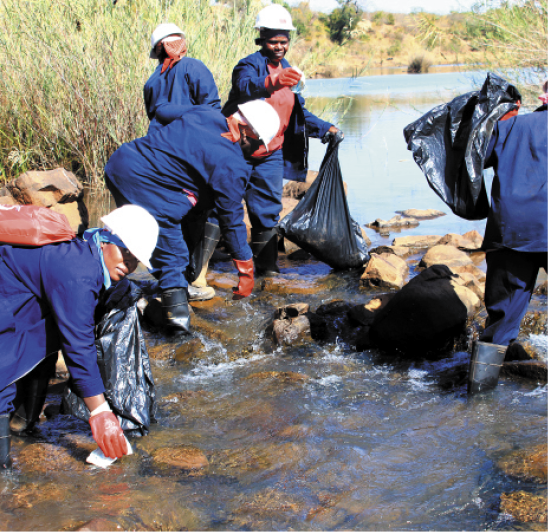 and non-profit organisations
and non-profit organisations
“The cooperatives and organisations that are funded by the NDA help to address development in communities. Many of them feed communities or fight Gender-Based Violence in our societies,” says Bouwer.
The cooperatives that the NDA assists must have the potential to help develop the local economy or promote food security.
“We also support initiatives started by the unemployed, the young, women and people with disabilities.”
The NDA also helps ensure that qualifying organisations remain sustainable and are able to carry out the work they do well into the future. It links organisations with local, provincial, national and international markets and opportunities.
“We fund the cooperatives that cannot get funding from banks. We also link up the smaller cooperatives with the bigger ones, so that they can do business together,” Bouwer explains.
Cooperatives that do embroidery and are involved in agriculture were the NDA’s main beneficiaries over the past year, according to Bouwer.
Cooperatives can apply for funding through provincial NDA offices where they will receive assistance to put together comprehensive funding requests, complete the application forms and submit the necessary supporting documents.
Bouwer says funding is awarded on a term basis, ranging from three months to one year.
For more information on NDA funding, email info@nda.org.za or call 011 018 5500.
NSFAS funding eligibility to be revised
NSFAS funding eligibility to be revised SiboneloThe Department of Higher Education and Training will soon release the revised National Student Financial Aid Scheme (NSFAS) Funding Eligibility and Terms and Conditions for 2022.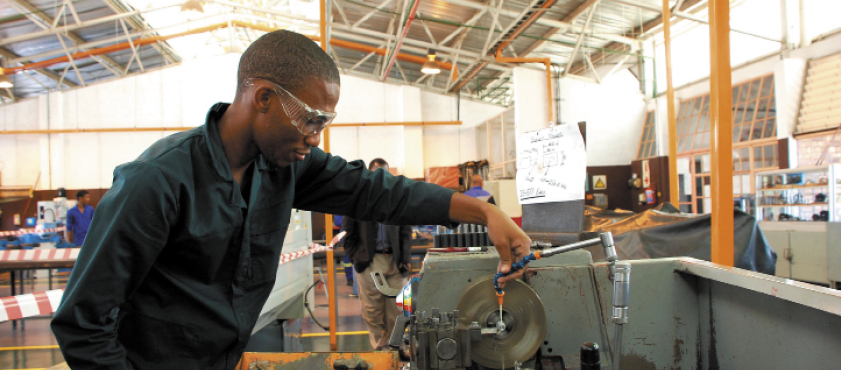
This follows an analysis of a group of 2021 students, during which NSFAS established that 38 744 students in Technical and Vocational Education and Training (TVET) colleges and universities continue to be funded, even though there was substantial improvement in their household income over that period.
Higher Education, Science and Innovation Minister Blade Nzimande said of this group of students, 32 654 have a household income that exceeds R400 000.
“Our analysis further shows that 7 081 of these students have a household income that exceeds R1 000 000 and 632 students have a household income that exceeds R2 000 000. These students will be de-funded.
“However, NSFAS must lodge criminal charges of fraud in such instances, though the affected students may at the same time be afforded the opportunity to lodge an appeal,”
He said. The Minister warned that NSFAS reserves the right to litigate and recover funds where instances of clear defrauding of the system have been identified.
NSFAS applications
NSFAS has received 906 429 applications for the 2022 academic year. Of these students, 85% have not studied at a public university before.
Students from poor and working-class backgrounds had from 2 November 2021 to 21 January 2022 to apply for NSFAS bursaries to further their studies at public TVET colleges or universities.
This allowed applicants, who were awaiting their National Senior Certificate results, the opportunity to apply.
NSFAS initiated a system improvement process to improve the turnaround time and facilitate speedy provisional funding decisions for students using third party sources such as the Departments of Home Affairs and Basic Education, South African Social Security Agency, and South African Revenue Service data.
“With this initiative, all first-time entering students that were successfully verified as SASSA beneficiaries received immediate confirmation of funding upon submitting a complete application to NSFAS,” Minister Nzimande said.
He added that the department will be able to fund students, who qualify for NSFAS funding and have been accepted at public TVET colleges and universities in 2022, on the department's bursay scheme. - SAnews.gov.za
NYDA database helps youth find jobs
NYDA database helps youth find jobs tsoanaAre you a young South African who is academically qualified but unemployed?
The National Youth Development Agency (NYDA) has a free online database for job seekers between the ages of 18 and 35 that could help you land a job.
The free online database has helped with job placements since 2005 and continues to link up the youth with prospective employers in various organisations around the country.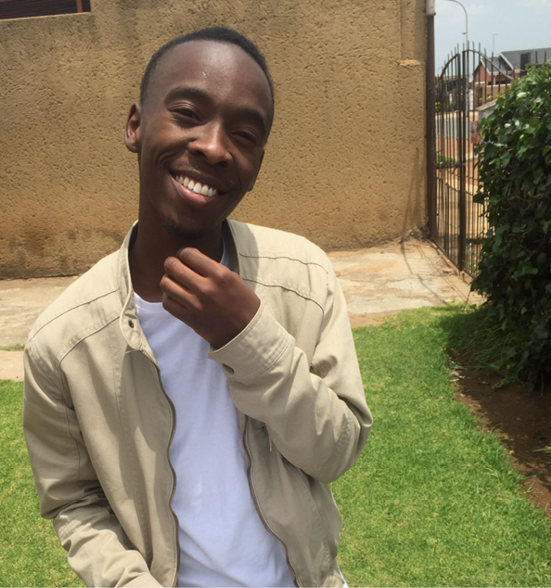
Sibusiso Mahlaba (21) from Soweto in Gauteng is a Boston College graduate who has benefitted from being on the database.
Mahlaba completed his Bachelor of Commerce degree in Management Marketing in 2020, and also did a certificate in Digital Marketing and e-Commerce in 2021.
In November 2021, he created a profile on the NYDA portal and submitted his documents. He then visited the NYDA office in Johannesburg and was assisted with parts of the application he was struggling with.
“A few days after registering, an NYDA official phoned me and told me that there were different organisations with job opportunities and the NYDA needed me to consent to it applying for the jobs on my behalf,” he says.
Two weeks later, Mahlaba received another call from the NYDA, informing him about an opportunity at the South African Social Security Agency (SASSA).
“The NYDA official told me what documents SASSA needed from me. After submitting the documents, I was called in for an interview.”
A few weeks later, Mahlaba got the job.
He now works as a customer care agent at the SASSA Gauteng Regional office in Johannesburg.
Criteria for NYDA online database
To load documents onto the NYDA online database, graduates need to:
- Be an unemployed South African citizen between 18 and 35 years old;
- Have graduated with a three-year qualification (national diploma or a university degree);
- Be in possession of a qualification from a Technical and Vocational Education and Training college.
Visit any of the NYDA branches to register your CV or contact the call centre at 087 158 4742.
New changes to COVID-19 regulations
New changes to COVID-19 regulations SiboneloCabinet has approved changes to the Adjusted Alert Level 1 Coronavirus Disease (COVID-19) regulations as South Africa has exited the fourth wave nationally.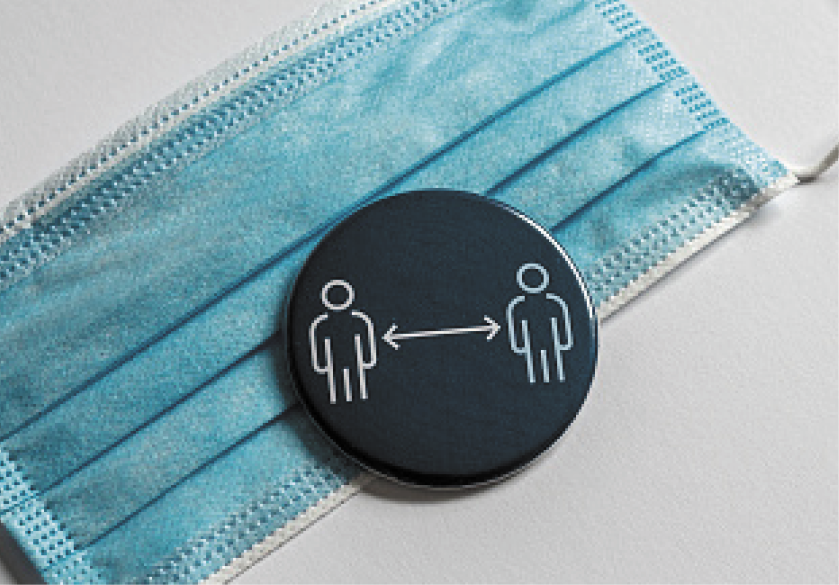
“With the new changes, those who test positive with no symptoms, do not have to isolate," said Minister in the Presidency, Mondli Gungubele.
The isolation period has been reduced from 10 to seven days for individuals who test positive and experience symptoms.
Contacts of COVID-19 positive cases do not have to isolate unless they develop symptoms.
“Cabinet also reviewed the resumption of schooling to full-time learning in all schools.
“Primary, secondary and special schools will return to daily attendance. The regulatory provision for social distancing of one metre for learners in schools has also been removed,” he said.
The changes came after meetings of the National Coronavirus Command Council (NCCC) and the President’s Coordinating Council (PCC), which received updates on the management of COVID-19 in South Africa.
“The rationale for these amendments is informed by the proportion of people with immunity to COVID-19, which has risen,” said Minister Gungubele.
He added that it was based on the trajectory of the pandemic and the levels of vaccination in the country, that Cabinet decided to make changes to Adjusted Alert Level 1. Government commended all South Africans who continue to observe COVID-19 regulations and protocols.
“We also remind those who are yet to get vaccinated to go for their COVID-19 vaccination and continue observing basic health protocols to prevent the transmission of the virus,” Minister Gungubele said. - SAnews.gov.za
For the latest COVID-19 vaccination sites, visit: https://sacoronavirus.co.za/active-vaccination-sites/
New laws strengthen the fight against GBV
New laws strengthen the fight against GBV SiboneloLate last year, I received a letter from a group of concerned citizens calling on the government to protect the women and children of this country from violence.
Pointing to an increase in rape and sexual assault, they wrote that as women they continue to live in fear; they are losing their faith in the law.
I was deeply moved and touched by their account of the fear that the women of our country are subjected to on a daily basis.
In response to the suffering that women and children are subjected to, we have passed laws designed to protect them. But despite penalties to remove perpetrators from society, women and children continue to suffer and die.
I recently signed into law three pieces of legislation that honour our promises to strengthen the criminal justice system, promote accountability across the state and put support for survivors at the centre of all our efforts.
The new Criminal and Related Matters Amendment Act protects the vulnerable from secondary victimisation by allowing courts to appoint intermediaries through which a minor, a disabled person or an elderly person can be examined in proceedings.
It also allows for the extended use of evidence by means of an audio-visual link. This helps to shield a witness against harm, prevent unreasonable delays and save costs in proceedings.
The new law also significantly tightens up our bail regime.
A prosecutor who does not oppose bail in designated cases must have their reasons placed on record.
The court must consider any threats of violence made against the complainant and the complainant’s view of their own safety. Unless the court is satisfied that exceptional circumstances exist that warrant release on bail, bail must be denied.
The new Criminal Law (Sexual Offences and Related Matters) Amendment Act outlaws sexual exploitation and grooming of persons with mental disabilities, and provides that sexual offences against persons who are mentally disabled must be recorded in the National Register of Sex Offenders (NRSO).
We have responded to calls to tighten up the management of the NRSO.
Those who have been convicted of sex crimes against children or mentally disabled persons, have previous convictions in this respect, and have been sentenced to terms longer than 18, months can only apply to have their names removed from the register after 20 years.
The Act further regulates the reporting duty of people who are aware that sexual offences have been committed against vulnerable persons.
The new Domestic Violence Amendment Act takes account of some of the complexities in violent domestic relationships.
We have tightened up the process of obtaining protection orders, and broadened the circumstances under which they can be applied for.
We have addressed the issue of women and children being victimised despite having, or being in process of applying for, a protection order.
If a court believes a complainant is in imminent danger it can issue a protection order immediately without needing to give a respondent notice of the proceedings.
Significantly, if the court releases someone charged with domestic violence on bail who does not have a protection order granted against them, the court must issue one after holding an enquiry.
When the court issues a protection order it must at the same time authorise the issuing of an arrest warrant, suspended, that must be provided to the South African Police Service (SAPS).
If a SAPS member suspects a complainant is in danger due to breach of the order, they must arrest the respondent immediately.
The Act now expressly protects the elderly from all forms of domestic violence, and also permits complainants to apply for protection orders online, saving them time and travel costs.
To protect complainants against further abuse, the court may an issue a Safety Monitoring Notice that will require a member of SAPS to be in constant contact with the complainant without the knowledge of the abuser.
Survivors of GBV often complain of ill-treatment or disregard for their concerns when they lay complaints at police stations. SAPS members who fail to comply with their obligations under the new law will be guilty of misconduct.
All adult persons who have knowledge or suspicion that domestic violence is being perpetrated against a child, a person with a mental disability or an elderly person are obliged to report such acts to a social worker or to the police. Failure to do so is a criminal offence.
This puts into law the principle that violence against women and children is everyone’s responsibility.
The passage of these new laws is a step in this direction. But it is not the solution. We must prevent violence and abuse from happening in the first place.
Working together as a society, we must use our voice, our agency and our reserves of courage to forever end the violence perpetrated by men against women and children.
New vaccine plant for Africa
New vaccine plant for Africa SiboneloA new Coronavirus Disease (COVID-19) vaccine manufacturing plant in Cape Town will enable Africa to access vaccines without having to compete with rich countries.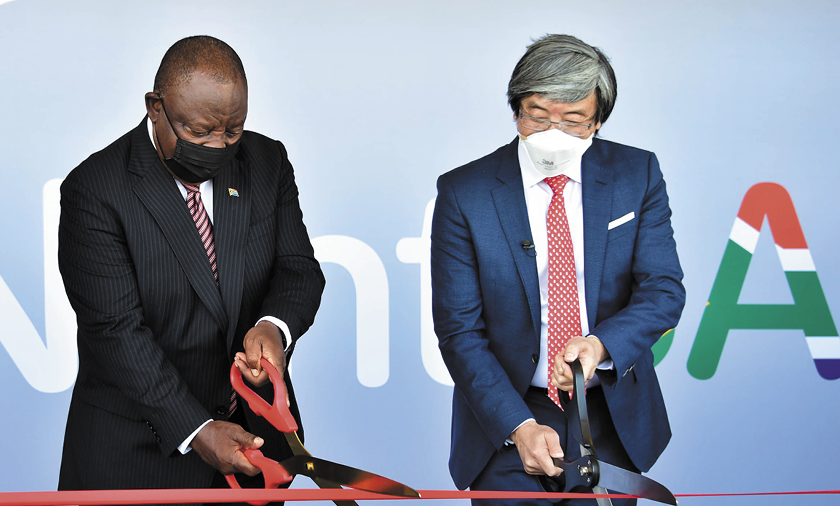
The Nant-SA Vaccine Manufacturing Campus in the Western Cape is owned by South African-born businessman Dr Patrick Soon-Shiong.
The plant will produce COVID-19 vaccines and will also make medicine for the treatment of cancer, TB and HIV.
“We now have the capability to use the human capital of South Africans to build 21st-century medicine.
“The construction of the campus is already complete. We are now working with the regulatory bodies. Within six months to a year, we will have the first vaccines rolled out,” said Dr Soon-Shiong at the recent launch.
The facility will also focus on the development of a second generation COVID-19 vaccine, with the aim to produce one billion doses a year by 2025.
“We want to manufacture this in Africa, for Africa, and export it to the world,” explained Dr Soon-Shiong.
President Cyril Ramaphosa said the state-of-the-art campus is part of a far broader initiative to propel Africa into a new era of health science.
Africa’s Access to Advanced Healthcare Coalition was also launched at the opening of the campus. The coalition will bring together biotechnology and pharmaceutical companies, government agencies, non-profit organisations and academia, who will collaborate to improve local pharmaceutical and vaccine production.
This will help make South Africa less reliant on other countries for medical imports.
“The pandemic has revealed the huge disparities that exist within and between countries in access to quality healthcare, medicines, diagnostics and vaccines.
“At the same time, the pandemic has revealed the depth of scientific knowledge, expertise and capacity on our continent. It has shown what we are capable of when we work together to mobilise all our resources to confront a common challenge,” said President Ramaphosa
According to Dr Soon-Shiong, the production of the vaccines will be done by a team of between 400 and 600 South Africans.
In addition to investing in the manufacturing plant, Dr Soon-Shiong is donating R100-million through the Chan Soon-Shiong Family Foundation, to help fund the education and training of a skilled workforce in the biotechnology and life sciences industry.
Prevent STIs
Prevent STIs SiboneloSexually transmitted infections (STIs) do not discriminate. They can affect anyone regardless of nationality, race, ethnicity, religion, gender, sexual orientation and economic status.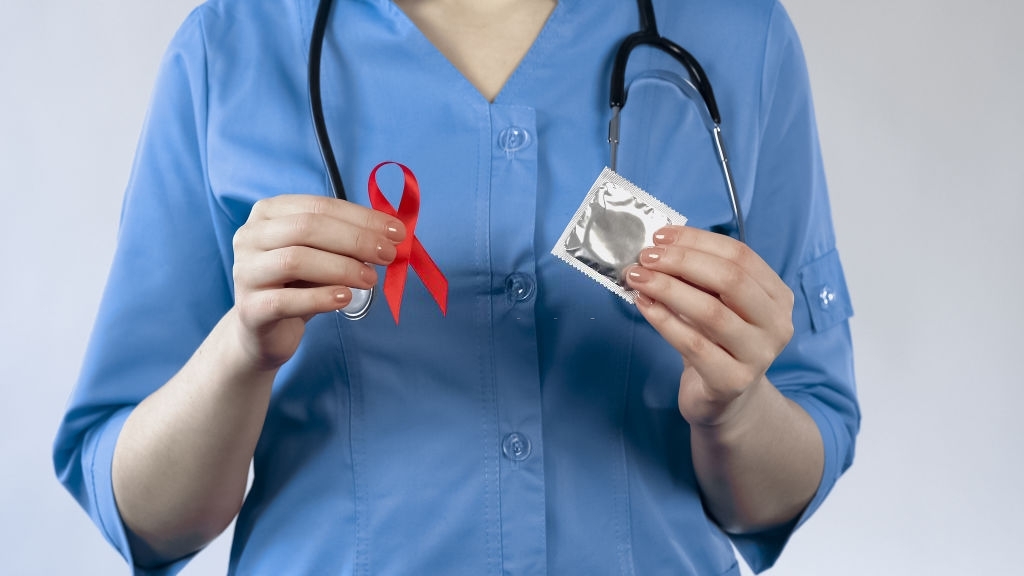
South Africa commemorates STI/Condom Week annually between 10 and 16 February. This is to raise public awareness around the importance of using a condom to prevent STIs and unplanned pregnancies, curb the spread of HIV and AIDS and root out STI stigma and discrimination.
According to the National Institute for Communicable Diseases (NICD), STIs are caused by bacteria, viruses or parasites and are spread mainly through unprotected (not wearing a condom) vaginal, anal and oral sex with an infected person. Some STIs can be spread by non-sexual means – for example, from mother to child during pregnancy or childbirth.
Two STIs, syphilis and genital herpes, can also be spread during touching or kissing if a person has sores on their genitals or mouth. Syphilis is a bacterial infection that starts as a painless sore; while genital herpes is a viral infection causing small, painful blisters that turn into ulcers.
“Getting treatment for genital herpes is very important as it reduces the risk of HIV infection,” says Dr Thato Chidarikire, the Director of the HIV Prevention Programme at the National Department of Health.
“Untreated STIs result in long-term complications, such as ongoing lower abdominal pain, infertility and adverse pregnancy outcomes like stillbirths and preterm delivery,” adds Dr Chidarikire.
Signs, symptoms and treatment
While many people with STIs may not have any signs or symptoms, there are some signs one can look out for says Dr Chidarikire.
“These include a discoloured vaginal discharge (yellow or green) or white (if it’s penile or anal); a foul smell; burning urination (although not all cases of burning urine is a sign of an STI) and pain in the lower abdomen,” she adds.
Because STIs are related to sexual transmission people feel uncomfortable talking about them says Dr Chidarikire.
“We encourage open communication between partners so that they can negotiate the issues of safe sex and condom use to reduce transmission, and discuss treatment if they become infected. If both partners don’t get treatment, they will reinfect each other,” she adds.
If you think you have an STI, go to your closest primary healthcare facility for free treatment and notify your current or recent sexual partners.
Richtersveld land reform success
Richtersveld land reform success tsoanaThe Richtersveld Community Property Association (CPA) in Alexander Bay in the Northern Cape is reaping the benefits of government’s land reform programme.
The Richtersveld CPA owns 195 150 hectares of land.
The land was handed over to the residents by th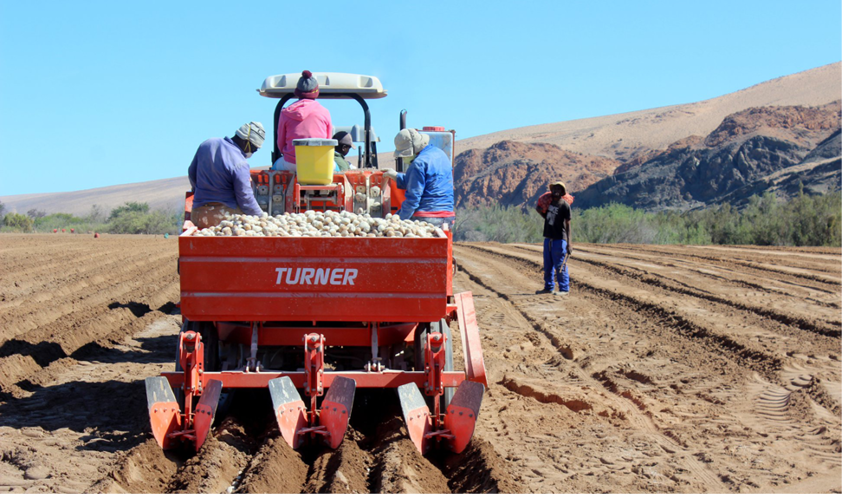 e Department of Agriculture, Land Reform and Rural Development, as part of the land reform programme in 2007.
e Department of Agriculture, Land Reform and Rural Development, as part of the land reform programme in 2007.
The project currently farms 13 hectares of potatoes, 54 hectares of lucerne, 171 hectares of maize, and 12 hectares of raisin grapes.
"We as the Richtersveld CPA are selling our poduce and crops to markets in Cape Town and Upington through an offtake agreement with an agriculture products maketing company. We also share the extra harvest amongst the members of the CPA,” says Richtersveld CPA spokesperson Abraham Cloete.
The Department of Agriculture, Environmental Affairs, Rural Development and Land Reform in the Northern Cape has donated a potato planter, two potato harvesters and two potato trailers valued at R3.2 million to the project.
In addition to this support, the department will donate a maize harvester, a drying facility for raisins and a centre pivot, which are valued at R3.5 million.
“The provision of the implements by the department has assisted us to harvest and plant more hectares of potato seeds that have been sold to commercial farmers,”says Cloete.
He adds that the CPA has also created 60 job opportunities for community members.
Northern Cape MEC for Agriculture, Environmental Affairs, Rural Development and Land Reform, Mase Manopole recently visited the farm and declared it a flagship project in the Namakwa District.
“We have invested a lot of money into the project with the hope of seeing the livelihood of the people of Richtersveld and surrounding areas being restored and impacted positively,” she said.
Contact the Northern Cape Department of Agriculture, Environmental Affairs, Rural Development and Land Reform at 087 630 0387
SAICA coaching boosts SMMEs
SAICA coaching boosts SMMEs SiboneloAn internet and printing shop has tripled its customers in only six months, thanks to the coaching it received from the South African Institute of Chartered Accountants (SAICA).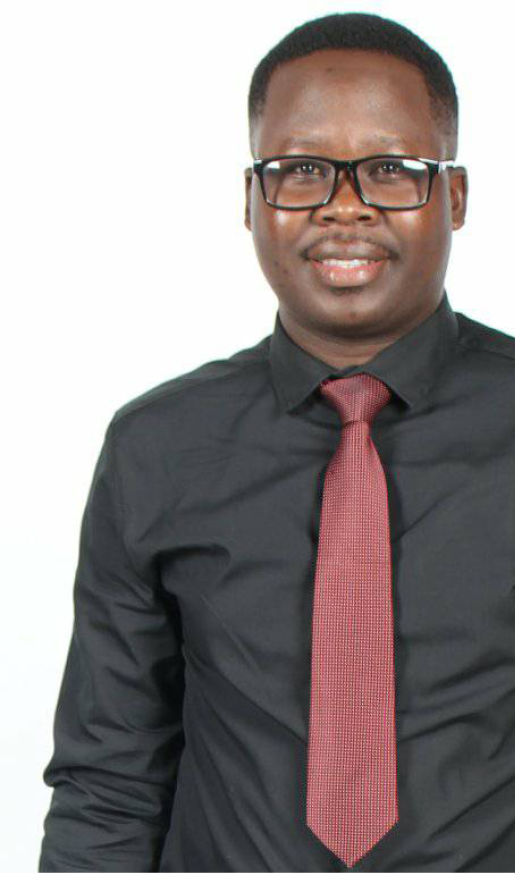
The SAICA Entrepreneurship Development (ED) programme linked Piet Rakabe (30) of PRR Trading and Projects to a business coach who taught Rakabe how to maximise his business potential.
“We used to get about 20 customers a day, but now I have 60,” Rakabe says.
Based in Mankweng, Limpopo, PRR Trading and Projects is an internet café that also assists students to apply for bursaries.
"We now know more about taking care of the business to make sure that it operates profitably,” says Rakabe.
Coaching for success
SAICA’s coaching and ED work helps small businesses navigate the ups and downs of managing a business. The coaches use their experience to teach entrepreneurs lessons that help to take businesses to new heights.
The programme focuses on the implementation of financial controls, business strategies and revenue generation. Entrepreneurs also learn about cost reduction tactics, as well as possible job creation and expansion.
Rakabe says his coach taught him how to manage PRR’s finances and move from being a cash-only business to one that accepts card payments. Customers found the card payment option convenient, he says, and the business has been able to retain customers and attract new ones.
Jameel Khan, Head of Projects at SAICA ED, says the programme aims to empower and develop financially savvy entrepreneurs.
“The purpose of the initiative is to connect businesses with qualified business professionals to foster business and business owner development and growth.
"We have seen a great demand for small, medium and micro enterprises (SMMEs) needing business finance coaching,” Khan says.
He adds that the growth of small black businesses will create employment opportunities.
“Despite the Coronavirus pandemic in 2020, we saw 22 new jobs created from 13 SMMEs in our SAICA ED flagship programme, as well as 77% of the SMMEs being able to generate a profit.”
SAICA ran a six-month ED flagship programme from June 2021 that supported Rakabe and 21 other SMMEs.
The high demand for coaching led to the launching of a second six-month programme in September 2021, which benefitted 46 youth- and women-owned SMMEs in various sectors.
For more information on SAICA ED, visit: www.saica.co.za/enterprisedevelopment
SAMRO hits right note with technology
SAMRO hits right note with technology tsoanaThe Southern African Music Rights Organisation (SAMRO) is using the latest technology to help local artists collect royalties.
SAMRO oversees the collection and distribution of royalty fees to artists.
The organisation represents 19 504 composer and publisher members in South Africa and over four million composers and authors worldwide.
Through its newly launched Business Replacement System, SAMRO says it can monitor airplay across various media such as radio, television and internet, making it easier to collect more revenue.
Music royalties are payments that go to recording artists, songwriters, composers, publishers, and other copyright holders every time their music is used.
SAMRO Chairman Nicholas Maweni says this is an attempt to help artists who have been hard hit by the Coronavirus Disease (COVID-19) lockdown since March 2020.
The live performance industry was halted, broadcast revenues slumped and our members’ livelihoods were terribly affected.”
Maweni says his organisation monitoring technology solutions to speed up the process of collecting royalties for SAMRO members.
Maweni adds that the system will also provide an online registration process for music users who want to apply for a music usage licence for their businesses.
The users will pay a licensing fee that will contribute to royalties for the artists.
Last year, SAMRO reached an agreement with social media platforms TikTok, Facebook and Netflix, which will enable the collection of royalties for all copyright-protected content featuring on these platforms.
“We have concluded the licensing agreements with various digital platforms and collection will be done with immediate effect,” says Maweni.
He urges both music users and creators to register as members of the organisation.
“All this will culminate in creating a healthy music industry for users and creators,” says Maweni.
To register, visit www.samro.org.za call 011 712 8000, fax 086 674 4391 or email customerservices@samro.org.za.
Sefa funds SMMEs
Sefa funds SMMEs tsoanaSmall, micro and medium enterprises (SMMEs) in various sectors are flourishing, thanks to the assistance they receive from the Small Enterprise Finance Agency (Sefa).
Sefa offers funding to qualifying SMMEs, including those owned and run by people with disabilities, military veterans, and people in rural areas and townships.
The agency’s various funds are permanently open for applications. Each fund has its own qualifying criteria, says Don Mashele, Sefa’s Head of Development Impact Support. Support is in the form of loans and/or grants.
Through its Direct Lending and Wholesale Lending programmes, Sefa can provide between
R500 000 and R15 million in financing, Mashele says.
“Through Direct Lending, a business can get asset and property financing. Through Wholesale Lending, a business can access a credit guarantee, as well as equity. Financing is through a bridging, revolving or term loan,” he says.
Sefa also provides post-funding business development support, including business and technical support; commercial and industrial rental of property; and institutional strengthening – when problem areas are identified by Sefa.
“We give priority to business in the services, manufacturing and agriculture sector. We also prioritise construction, mining, green industries, and information and technology businesses,” he says.
A beneficiary of the Small Enterprise Manufacturing Support programme (SEMSP), Nokuthula Dladla (64) says that Sefa bought a road sign-making machine for her company, Wanotha Road Signs, and helped with capital for staff salaries.
SEMSP helps businesses in townships, rural towns and villages by providing financial and non-financial support to small-scale manufacturers.
“I received R4.9 million from Sefa in 2021, of which 18% was a grant. The financing from Sefa has helped grow our productivity and allowed me to hire 15 people.
"Prior to this funding, I was buying the signs elsewhere and the selling them at a mark-up. Now that I am making them myself, I am able to produce them faster and sell them cheaper,” says Dladla.
How to apply for funding
When applying for Sefa funding, you must submit:
- Certified copies of your identity document, and business registration and compliance documentation;
- Supporting quotations for the assistance needed;
- A personal income and expenditure schedule; and
- An assets and liabilities statement.
Sefa funding programmes include the Township and Rural Entrepreneurship Programme; the Small Enterprise Manufacturing Support Programme; the National Youth Policy; The Inyamazane Funding Scheme for military veterans; the
Amavulandlela Funding Scheme for people with a disability; and the Godisa Supplier Development Fund, for Transnet suppliers.
Contact Sefa at 012 748 9600, email helpline@sefa.org.za or visit the website https://www.sefa.org.za.
Seta offers free skills courses
Seta offers free skills courses tsoanaThe Services Sector Education and Training Authority (Seta) is offering free entrepreneurship courses to individuals and cooperatives. The Seta appointed Chartall Business College to develop four customised e-Learning courses, targeting four beneficiary groups.
“On offer are the Cooperative Governance and Entrepreneurial Mindsets Course, targeting 300 cooperatives; the Entrepreneurial Skills Course, targeting 100 individuals; the Sustainability Course, targetin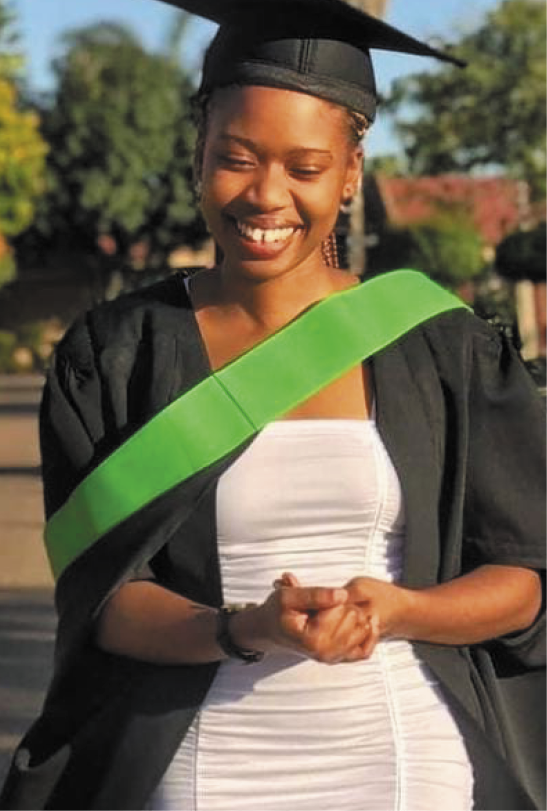 g 100 non-profit organisations; and the Start-ups Course, targeting 100 people to be trained to start a business,” explains Duduzile Mwelase, senior manager in organisational brand management at Services Seta.
g 100 non-profit organisations; and the Start-ups Course, targeting 100 people to be trained to start a business,” explains Duduzile Mwelase, senior manager in organisational brand management at Services Seta.
She says even though the courses are offered online, subscribers do not need to worry about data as the learning platform is zero-rated.
“Zero-rated means that participants do not need data to access the material. The courses are self-based (needs your device) and self-paced (own convenient time), therefore participants determine how long it takes for them to complete the course content, workbook and assessments,” says Mwelase.
Unemployed graduates
Mosibudi Makgopa (23), who recently graduated with a degree in agriculture from North-West University, has completed the Start-Up Course.
“In November last year, I came across a poster on the Seta website. I sent an email with my details and the course I was interested in, and then I was added to the list. A few weeks later, I was notified the course was ready.
“I then went onto the platform to submit my documents and started the course,” she explains.
Makgopa completed the course in two weeks. She says it covered many aspects of starting a business, including coming up with business ideas, product/service development, sales and marketing and financial literary.
Makgopa wants to venture into the agricultural sector.
Submit your application for any of the courses at https://forms.office.com/r/sTfkFPDGmg
For more information, visit the Services Seta website at www.servicesseta.org.za or send an email to entrepreneurship@servicesseta.org.za
Taking local art to the world
Taking local art to the world tsoanaThe Department of Sport, Arts and Culture (DSAC) has named three local artists whose artworks will be showcased during Biennale Arte 2022. The festival, which is often described as the Olympics of the art world, will be held in Venice, Italy, from 23 April to 27 November 2022.
This year’s festival theme is ‘The Milk of Dreams’.
Johannesburg-based visual artist Phumulani Ntuli, photographer Roger Ballen and visual artist and photographer Lebohang Kganye will exhibit their respective creations – Godide, Theatre of the Apparitions, and B(l)ack to Fairy Tale – at the South African pavilion, which has been sub-themed ‘Into the Light’.
According to the department, the theme reflects the richness of creative expression that is unlocked when the artist combines fantasy and re-imagination into their self-identity.
“For his Theatre of the Apparitions showcase, Ballen developed his own technique, coating glass in special paints, etching off the coating and backlighting the glass. Kganye photographed herself autobiographically as the protagonist in westernised fairy tales,” says the department.
Ntuli’s work utilises stop-motion animation.
Stop motion is an animated filmmaking technique in which objects are manipulated.
Since 2011, the department has been providing monetary sponsorship to the participating artists. This is part of the department's mandate to provide market access to artists, says DSAC Director-General Vusumuzi Mkhize.
Reaching greater heights
Johannesburg-based Ntuli (35) holds a Masters in fine arts from Ecole Cantonale D’Art du Valais in Switzerland.
He says the festival is an opportunity for him to engage with a diverse international art community that includes collectors, art institutions, galleries and the general public.
Ntuli adds that it is also a chance to share both old and current South African art, narratives and history with others.
The backing of the department has allowed him to expand the scope of his work, he says. “I have been planning to expand as an art entrepreneur and have been unable to do this in my own capacity. With the assistance of the department, such business endeavours are now possible,” adds Ntuli.
Taxi industry gets COVID-19 Relief Fund
Taxi industry gets COVID-19 Relief Fund tsoanaSouth African taxi operators and owners are in line to benefit from a once-off Coronavirus Disease (COVID-19) Relief Fund.
Transport Minister Fikile Mbalula says the R1.35 billion relief fund will be shared by 137 000 minibus and 25 000 metered taxis and 63 000 e-hailing operators.
The taxi industry was one of the severely affected sectors during the Level 5 national lockdown in 2020. As travel was limited, citizens were urged to work from home and cut out non-essential travel.
Minister Mbalula says his department partnered with the National Empowerment Fund to manage the distribution of the funds.
“Almost 20% or more of the taxi industry experienced total loss of income.
This included long-distance and cross-border operators as a result of the closure of international borders and the prohibition of inter-provincial travel,” says the Minister.
of the closure of international borders and the prohibition of inter-provincial travel,” says the Minister.
Thabiso Makhubela, an owner-driver from Ga-Rankuwa in Gauteng, can attest to this.
“The national lockdown hurt us as owners. Some taxis were repossessed. This relief fund will help to elevate some (financial) pressure,” says Makhubela.
How to apply
Applications for the relief fund can be found on the department’s website.
Applications can be completed online by the taxi operator/owner or with the assistance of a call centre agent.
To qualify for the relief, the applicant must:
- Be a South African citizen or a permanent resident;
- Be in possession of a valid operating licence or a receipt as proof of renewal issued on or before the date of the declaration of the national state of disaster;
- Be registered with the South African Revenue Service as a taxpayer.
The closing date for applications is 28 February 2022.
For more information, visit: http://transport.gov.za, contact the call centre toll free on 0800 201 971 or SMS: 45864.
Tech can put small town businesses on the map
Tech can put small town businesses on the map tsoanaBLOEMFONTEIN AGENCY leads the way in digital and social media marketing
If you are tech savvy and live in a small town, local businesses might need your skills to market themselves in an increasingly digital world.
“If you live in a city or town that hasn’t adapted to digital platforms, recognise this and help businesses and employees in your area to make the shift,” says Nadia von Maltitz (29). 
She is the owner of Cuberoo, a digital and social media advertising agency in Bloemfontein, Free State. The agency offers creative, marketing and digital strategies to small and large businesses.
After working at different advertising agencies, Von Maltitz started her own agency in July 2017. She received R48 000 in funding from the National Youth Development Agency (NYDA), which she used to buy computers and software for her business.
The motivation to start Cuberoo came from Von Maltitz's understanding that businesses need practical ways of marketing to not only survive, but thrive in the 21st century.
“Marketing has changed radically over the past few years and Cuberoo helps businesses keep up,” she says.
Getting and retaining clients
Von Maltitz says this line of business needs one to never stop researching trends in order to help clients get ahead in their field.
She says the new developments in the world inspired the creation of the digital agency.
“We realised the world was moving to a digital space early on before the Coronavirus Disease hit and everything became more geared to a digital world of business,” she says.
Von Maltitz adds that- starting a business is easy but keeping it afloat and making it grow requires hard work. “Create value and seek solutions to problems. Don’t mainly think about making money.
Think about making the world better and money will follow. Educate yourself on finances, business and sales,” she says.
Von Maltitz adds that, Cuberoo is successful due to the excellent customer service it offers to its clients.
For more information on NYDA funding, contact the NYDA at 087 158 6345/5738 or email: info@nyda.gov.za Contact von Maltitz on nadia@cuberoo.com
Tech training leads to rhino poaching solution
Tech training leads to rhino poaching solution SiboneloSouth Africa’s Seeds for the Future team placed in the top 10 of the Tech4Good global competition, which encourages the use of technology to solve both local and global issues.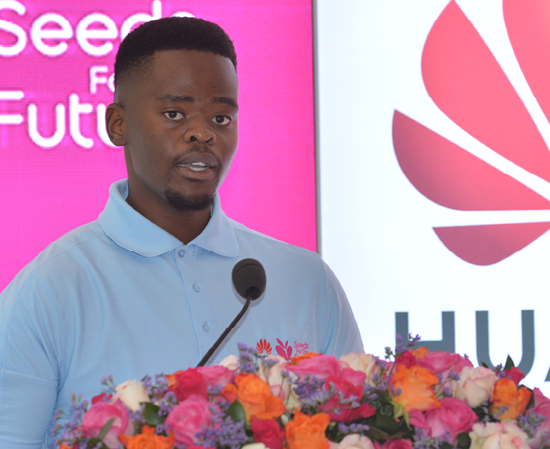
The group of 12 youngsters impressed the judges with their innovative take on how technology can help combat rhino poaching.
Team South Africa 2021 was selected from over 200 candidates from 20 universities and colleges across seven South African provinces.
Their creation, ‘SA-Tech − South Africa’s Intrusion Detection System’, uses together cameras and motion sensors to feed information into the cloud to help detect poachers.
Vhuthuhawe Munyai (20) says his team chose rhino poaching because of how often rhinos are killed in South Africa.
“South Africa has the majority of the world’s rhinos and, unfortunately, we are the country that experiences the most poaching. Our project will not only help protect these species, but also protect rangers from poachers.”
Successful collaboration
In 2016, South Africa joined Huawei’s prestigious global training programme, Seeds for the Future, through a collaboration between Huawei and the Department of Communications and Digital Technologies (DCDT).
The programme aims to develop local Information Communication Technology (ICT) talent, prepare students for the world of work and bridge the digital divide. To date, 90 students have gone through the programme, which includes an exchange programme hosted in Beijing, China.
“I've always yearned to go to China and explore its technology, because – as the world can see – China is the most technologically advanced country, and it’s leading for a reason. "I’m sure being exposed to Huawei will light up my career path,” says Munyai. He is completing his Bachelor of Science degree in mathematical sciences at the University of Limpopo.
DCDT Minister Khumbudzo Ntshavheni says she hopes that the beneficiaries of the initiative appreciate the value of the programme and act like true seeds – multiplying themselves for the benefit of the country, the SADC region, and the continent.
She confirmed that the partnership will continue for the foreseeable future. “This is part of our commitment to support young people in the ICT sector to become job creators,” says.
Warning signs of bullying
Warning signs of bullying SiboneloBullying is frighteningly common in many schools and parents need to be able to spot the signs that children are being bullied.
Bullying can be physical, verbal or emotional and is usually repeated over a period of time.
It can occur in or around the school building and often occurs during breaks.
Perpetrators of bullying could be one person or a group of children who gang up against one child.
Forms of bullying could include fellow pupils calling your child names, making things up to get them into trouble, hitting, taking things away from your child, damaging their belongings, stealing their money and spreading rumours.
- Find out what happened, who was involved, and when and where it happened, and keep a record of this information;
- Assure your child that you will immediately investigate and report the situation to the school principal or senior teacher;
- Suggest that the school increases supervision in the high-risk areas where the child has to go or more closely monitor the child’s interactions with other learners;
- Encourage your child to talk to an adult, such as a supportive teacher, every day to provide an update on the mistreatment;
- Avoid being a 'fix-it' dad or mom by calling the bully’s parents. Most of the time, this action is not effective;
- Don’t tell your child to retaliate. It’s against the rules, and retaliation frequently makes the bullying worse and more persistent;
- Teach your child to be assertive, but not aggressive.
This information was supplied by the Department of Basic Education.
What you need to know about PreP
What you need to know about PreP SiboneloIf you are HIV-negative but at risk of contracting HIV, you can prevent being infected by taking the Pre-Exposure Prophylaxis medication (PreP).
HIV-negative people who take PreP daily can lower their risk of HIV infection by up to 90%. Those who are already HIV-positive, however, need to be on anti-retroviral treatment for the rest of their lives to stay healthy.
For PreP to work effectively, an HIV-negative person needs to take it once a day at roughly the same time. It takes up to seven days for a person to be protected from HIV when they start PreP.
PreP requires strict adherence to daily medication and regular HIV testing. If you missed taking the pill at your regular time, you need to take it as soon as possible, and then continue to take it as before.
Where possible, this pill should be used together with other HIV prevention methods, such as using a condom when engaging in sexual activities.
PreP only offers protection against HIV. It does not protect you from other sexually transmitted infections or pregnancy.
When taking PreP, you may experience mild side-effects, such as nausea, headaches, tiredness, vomiting and depression. These side effects usually disappear after a few weeks.
For more information about PreP, visit your nearest healthcare centre.
This information was supplied by the KwaZulu-Natal Department of Health.